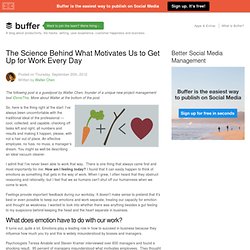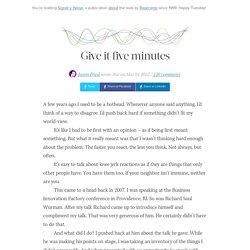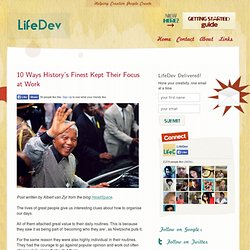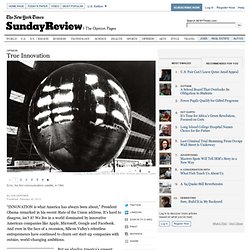

The science behind what motivates us to get up for work every day. 2.6K Flares Filament.io 2.6K Flares × The following post is a guestpost by Walter Chen, founder of a unique new project management tool IDoneThis.

More about Walter at the bottom of the post. So, here is the thing right at the start: I’ve always been uncomfortable with the traditional ideal of the professional — cool, collected, and capable, checking off tasks left and right, all numbers and results and making it happen, please, with not a hair out of place. John Cleese on the 5 Factors to Make Your Life More Creative. By Maria Popova “Creativity is not a talent.

It is a way of operating.” F. Scott Fitzgerald on Mastering the Muse and How This Side of Paradise Was Born.
How to Be a Top 50 Innovator. Give it five minutes. A few years ago I used to be a hothead.

Whenever anyone said anything, I’d think of a way to disagree. I’d push back hard if something didn’t fit my world-view. It’s like I had to be first with an opinion – as if being first meant something. But what it really meant was that I wasn’t thinking hard enough about the problem. The faster you react, the less you think. It’s easy to talk about knee jerk reactions as if they are things that only other people have. This came to a head back in 2007. And what did I do? His response changed my life.
This was a big moment for me. Richard has spent his career thinking about these problems. There’s also a difference between asking questions and pushing back. Learning to think first rather than react quick is a life long pursuit. If you aren’t sure why this is important, think about this quote from Jonathan Ive regarding Steve Jobs’ reverence for ideas: That’s deep. There are two things in this world that take no skill: 1. Entrepreneurs Need Creative Thinking After the Idea. 10 Ways History’s Finest Kept Their Focus at Work. Post written by Albert van Zyl from the blog HeadSpace.

The lives of great people give us interesting clues about how to organise our days. All of them attached great value to their daily routines. This is because they saw it as being part of ‘becoming who they are’, as Nietzsche puts it. For the same reason they were also highly individual in their routines. They had the courage to go against popular opinion and work out often strange daily plans that suited them. This is perhaps the first lesson that we can learn – that it takes courage and resolve to design and stick to a routine that suits you.
There are at least 10 other lessons that the daily routines of the great can teach us: 1. Despite the modern obsession with physical presence at offices (also known as ‘presenteeism’), very few of the great worked long hours. Philosopher Michel Foucault would only work from 9am to 3pm. 2. Even during these short days, the great took plenty of breaks. Innovation and the Bell Labs Miracle. But we idealize America’s present culture of innovation too much.

In fact, our trailblazing digital firms may not be the hothouse environments for creativity we might think. I find myself arriving at these doubts after spending five years looking at the innovative process at Bell Labs, the onetime research and development organization of the country’s formerly monopolistic telephone company, AT&T. Why study Bell Labs? It offers a number of lessons about how our country’s technology companies — and our country’s longstanding innovative edge — actually came about. Yet Bell Labs also presents a more encompassing and ambitious approach to innovation than what prevails today. Indeed, in the search for innovative models to address seemingly intractable problems like climate change, we would do well to consider Bell Labs’ example — an effort that rivals the Apollo program and the Manhattan Project in size, scope and expense. Woz on Creativity: Work Alone.